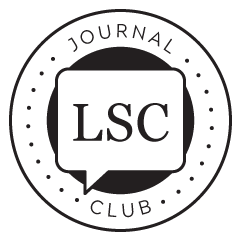For most library practitioners, keeping up with developments and trends in the field is a key part of day-to-day life. Whether you’re a library student, a seasoned librarian at an academic library, or a library technician serving a rural public community, it is crucial to maintain a working knowledge of the issues that inform library practice and impact the communities we work in.
To stay informed, many turn to the standard methods of learning and information sharing like workshops, conferences, webinars, blogs, books, and list servs. However, an exciting new platform for professional learning has been building momentum in library networks around the world — and it promises to expand the possibilities of library professional development: library journal clubs.
Library Journal Clubs
 Library Journal Clubs (also referred to as discussion groups or reading groups) invite library students and professionals to engage with new and exciting research topics of interest. Participants read an article or other relevant publication on a monthly/bi-monthly basis and then come together to discuss, evaluate, and share their responses. The structure of journal clubs is flexible and groups can alternate between topics depending on the interests or focus of the library community. As an added bonus, participants can also hone their presentation and discussion facilitation skills by leading a session that is of particular interest to them.
Library Journal Clubs (also referred to as discussion groups or reading groups) invite library students and professionals to engage with new and exciting research topics of interest. Participants read an article or other relevant publication on a monthly/bi-monthly basis and then come together to discuss, evaluate, and share their responses. The structure of journal clubs is flexible and groups can alternate between topics depending on the interests or focus of the library community. As an added bonus, participants can also hone their presentation and discussion facilitation skills by leading a session that is of particular interest to them.
The value of engaging with research publications and discussing topics of interest has been proven in the medical field, where journal clubs have been a well-established practice for decades. For healthcare professionals, journal clubs are a mechanism to “update their knowledge, promote critical thinking and research, assess the validity and applicability of the literature, improve skills in critical appraisal, increase the use of literature in clinical practice and to influence changes in care practices” (Balling et. al. 2008).
In the library sphere, journal clubs can fulfill many of the same goals. Participants are able to carve out time for valuable professional development, knowledge building, and community engagement around ideas that influence libraries.
Library Services for Children Journal Club
Inspired by the success of journal clubs in other fields and keen to support accessible opportunities for research-based discussions for children’s library staff, we set out to create a multi-platform journal club for children’s library services. We wanted to create a structure that maximized the potential for participation by offering many ways to get involved, from in-person meet-ups in Vancouver to online idea sharing via blog posts and Twitter.
Launched in November 2017, the Library Services for Children Journal Club presents an opportunity for any library staff or student interested in youth services work to join in critical dialogue about ideas that matter.
Discussion pieces fall into one of six themes—child development, inclusivity, community engagement, library as place, STEAM, and policy and practice—and will take place once every two months. All articles can be accessed via the journal club website and participation can take place in person or online.
Our hope is that the LSC Journal Club will inspire other library staff across the province (nay, world?) to think about starting their own journal clubs. The journal club model is easy, accessible, and adaptable to any library topic or sphere and can offer a fantastic addition to our traditional avenues of professional development.
Final Thoughts
The importance of opportunities to stay current on relevant research cannot be over-emphasized. A recent BCLA survey of learning needs for library staff in British Columbia specifically highlighted a demand for “staying informed of emerging trends and issues.” Journal clubs, where library staff of all levels can meet and engage with library topics, meet this need in a meaningful way. Participants can develop their research skills, build on their knowledge of trends and issues relevant to their work, and expand their options for professional growth.
> Christie Menzo is the Assistant Manager of Early Years at Vancouver Public Library. She is passionate about promoting early literacy in the community and strengthening research and critical dialogue in the field.
> Lindsey Krabbenhoft is a children’s librarian in Vancouver, BC. You can find her blogging and singing on Jbrary, a YouTube channel and blog featuring resources for storytime and other youth services topics, or tweeting up a storm at @lmkrabbenhoft.
Project Coordinator, BCLA

